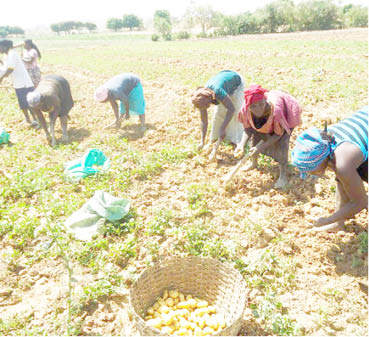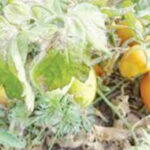In the past 36 months, many farms have gone down and millions of jobs in the agricultural sector have been lost.
Most small, medium, and large-scale farms located along the major highways are either shut down completely or shrunk to smaller sizes with skeletal production. Fishery, poultry and other livestock farms are the most affected, while crop farmers battle endless input price hikes.
Experts say Nigerian commercial banks do not provide agri-friendly loans as most of their credit facilities are given at two-digit interest rates (22 to 28 per cent), which is hard for any farmer under such loans to break even. Those who have tried collecting at such rates have had their fingers burnt.
For example, statistics from Dataphyte indicated that between 2014 and 2021, commercial banks lent only 5.1% of their total loans to agriculture.
Towards abolishing colonial legacy of HND/BSc dichotomy
Social media as driving force of drug abuse among youths
Although the Central Bank of Nigeria has created several financial windows for small, medium and large-scale farmers to access credit, cases of corruption and bottlenecks make it even more difficult for “real farmers” but easier for “political farmers”.
Farmers say it is increasingly difficult to run a farm successfully today as access to finance, which started shrinking since 2021, is worsening their situation, particularly for commercial farmers.
“In the last two years, it has been difficult to run my farm. The cost of inputs and transport suddenly went up and whatever I was getting from the farm could not sustain operations. For those of us in the livestock industry, no matter what happens, you have to feed the animals,” Peter Audu, who runs a medium-scale poultry farm in Masaka, Nasarawa State, told Daily Trust.
Audu, whose birds have now reduced from 1000 to 200, said he had not met any farmer, particularly those in the area in poultry and fishery space that has made any serious profit in the last two years, adding that the challenges are growing as access to funds shrinks.
“Even farmers who are creative need money to immediately come up with innovations to cushion the effects but where are the funds,” he asked.
Chief Daniel Okafor, a farmer and potato value chain processor, based in Abuja, also told Daily Trust that access to finance is a “big problem.”
“Commercial farmers can’t get finance for their farm projects. The requirements to obtain loans for farming, marketing, and value chain of farmers’ products is very hard. I approached a commercial bank, and they requested the following: a certificate of occupancy of the farmland, the flexibility and valuability of the project and environmental assessment.
“They told me that the farmland has no access route, no water, power, no security and other facilities. All these are bottlenecks and as long as all the above are not in place, forget it,” he said.
He, however, advised that the incoming government should address first and foremost, “Security, second security, thirdly security; fourth electricity, five, irrigation, sixth, rural roads, and again strengthen insurance.”
Also speaking exclusively with Daily Trust, Dr John Abraham Godson, a livestock farmer, with exotic breeds in Abuja, who also has farms in Europe, said agriculture is unique and critical to the economy, security and survival of every nation.
Dr Godson said the “European Union understands how critical agriculture is that is “why they subsidize agriculture and have several sectoral grants and loan schemes for farmers.
“In Nigeria, unfortunately, we are paying lip service to supporting agriculture. We read of the billions of naira given to farmers – yet these funds are not reaching the real farmers.
The “cost of agricultural input is on the rise. Many farmers cannot afford to continue farming talk less of scaling up,” he said.
Dr Abraham therefore stressed on the need for the new government to give special attention to agriculture.
“Agricultural reform, access to funds, capacity building of farmers, modernization of agricultural value chain, processing and storage should be the focus of the new government.
“Today, the population of Nigeria is 225 million. In just 27 years – we will be 420 million. These are mouths to feed. This growth will also deplete agricultural land for infrastructure for this teeming population. If we do not speed up to be on the cutting edge of innovation and technology in agriculture – the herder/farmer crisis we are facing today will look like child’s play,” he warned.
Arch. Kabiru Ibrahim, a farmer, described the current situation as “very daunting and next to impossible to remain in agricultural business in Nigeria today due to the cost of production and the sale of the products produced by the farmers.”
Ibrahim, who is the national president of the All Farmers Association of Nigeria, said food and all agricultural inputs are going through crushing inflation against “low purchasing power,” so the situation is very worrisome.
“We are almost despondent today due to a combination of all these interconnected threat factors, and access to finance is getting exceedingly difficult, largely due to the farmers’ inability to pay back and the omission or commission of the CBN in implementing the Anchor Borrower programme,” he noted.
He recommended that the incoming Tinubu administration “meticulously incentivize farmers by carefully analysing agricultural competencies and the regions possessing a comparative advantage in producing them and go on to subsidise the production directly.
“Each of the six geopolitical zones should be appraised and its staples identified with a view to optimising the productivity of all those staples such that the impact will be felt within the first year of the administration,” he advised.
Until something is urgently done, more jobs are most likely going to be lost as more farmers shut down operations.




